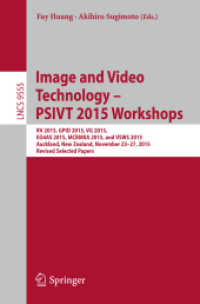- ホーム
- > 洋書
- > 英文書
- > History / World
Full Description
Communist East Germany's demolition of Leipzig's perfectly intact medieval University Church in May 1968 was an act decried as "cultural barbarism" across the two Germanies and beyond. Although overshadowed by the crackdown on Prague Spring mere weeks later, the willful destruction of this historic landmark on a central site symbolically renamed Karl Marx Square represents an essential turning point in the relationship between the Communist authorities and the people they claimed to serve. As the largest case of public protest in East German history between the 1953 Uprising and 1989 Revolution, this intimate local trauma exhibits the inner workings of a "dictatorial" system and exposes the often gray and overlapping lines between state and citizenry, which included both quiet and open resistance, passive and active collaboration. Through deep analysis of untapped periodicals and archives (including once-classified State documents, Stasi, and police records, and extensive private protest letters), it introduces a broad cast of characters who helped make the inconceivable possible, and restores the voices of not a few ordinary citizens of all stripes who dared in the name of culture, humanism, and civic pride to protest what they saw as an inconceivable tragedy. In this city that later started the 1989 October Revolution which ultimately triggered the fall of the Berlin Wall, residents from every social background desperately hoped to convince their leaders to step back from the brink. But as the dust cleared in 1968, they saw with all finality that their voices meant nothing, that the DDR was a sham democracy awash with utopian rhetoric that had no connection with their everyday lives. If Communism died in Prague in 1968, it had already died in Leipzig just weeks before, with repercussions that still haunt today's politics of memory.
Contents
Contents
Preface
Abbreviations
A Brief Chronology: Augustus Square - Karl Marx Square
Introduction
Chapter 1: Missed Chances, 1949-1959
Chapter 2: Outrage at the Exhibition of 1960
Chapter 3: Demolitions and Dread, 1961-1964
Chapter 4: The Buildup to Detonation in 1968
Chapter 5: Total Disconnect, 1968-1989
Epilogue: The Impossible Memory Site
Notes
Glossary of Leading Figures
Bibliography



![DVD>齋藤正章の順張りと手仕舞いの検証 [Wizard Seminar DVD Library] D-6512 <DVD>](../images/goods/ar2/web/imgdata2/47759/4775965123.jpg)




